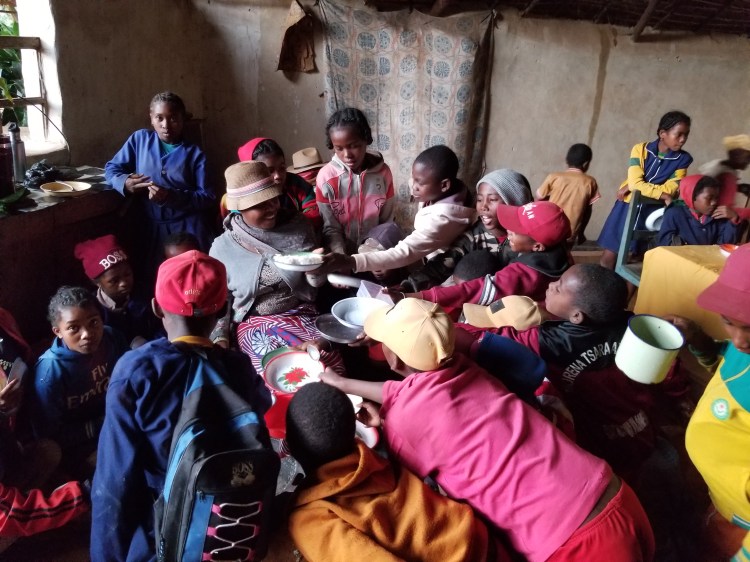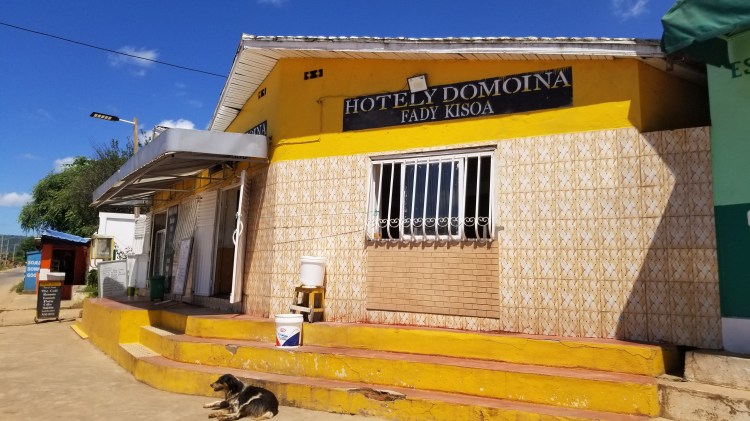
Early on in our service, my friend and fellow Peace Corps volunteer Jamie Mustful purchased a wide variety of seeds, including onion seeds, to plant in her newly created garden.
But after excitedly telling others in her village about what she planned to grow, she was told that under no circumstances was she allowed to plant the onions.
Until then, Jamie hadn’t realized the people in her village had a problem with onions. Like other people here in Madagascar, her community buys the purple, golf-ball-sized bulbs at the market and adds them to just about every side dish when they can afford to do so.
But while people in her village are happy to eat onions, no one is allowed to plant them, not even the foreigner in their midst.
Jamie quickly learned that planting onions in her village is “fady,” a Malagasy word that is often translated to mean “taboo.” Her community explained to her that many people will get sick and die if anyone grows onions.
The origin of this particular fady is anyone’s guess. Perhaps a rare attempt to grow onions in her village coincided with a major outbreak of disease many years ago, leading an elder to make the unlikely connection and declare farming onions to be fady.
It sounds silly, I know. But for the Malagasy people, especially those in rural villages, fadys are incredibly powerful beliefs; I expect most people would sooner break the law than violate a fady.
While fady and other traditional beliefs may be most present in rural Madagascar, even educated people in the cities take them seriously. It’s just that deeply rooted in Malagasy culture.
“In Madagascar, where animism is still prevalent, it is believed that the boundary between the sacred and the profane is defined by the fady,” anthropologist Michaël Randriamaniraka told a journalist from Mongabay.

Fadys are more diverse than you can imagine, with many relating to just one person or family. Once something is declared fady, people will follow it for generations whether they remember the reason for it or not.
While my host sister, Fanja, can eat chicken hearts, her 7-year-old son, Faneva, cannot. That’s because chicken hearts are fady in Faneva’s father’s family. Even though Fanja doesn’t know the reason for the fady, she never cooks the chicken’s heart with the rest of the meat. Instead, we often give it to my dogs, Chrissy and Nihoha.
When fady relates to food, people in Madagascar treat it like we treat a serious food allergy. One women I met couldn’t eat chicken unless it was killed by a man. So when chicken was served for lunch during a training in December, the host, after learning about her fady, had the cook prepare a different meal for her.
You see, the meat was purchased at the local butcher, and there was no way to tell whether a man or a woman killed the chicken. Better to be safe than sorry.
Other fadys are shared by people throughout the country. Some of the most common examples are pointing at tombs, raising dogs or eating pork, likely a result of Islam’s influence in Madagascar.
It’s so common to find Malagasy restaurants with a sign outside stating “Fady kisoa” — meaning pork is not served there — that one volunteer in my group early in our service mistakenly thought it was the name of a chain of restaurants.
In some cases, like in my friend Jamie’s village, the reason for a fady can feel, well, bizzare.
In a community in southeast Madagascar, people are forbidden from fishing in the ocean with nets. The reason? A local king long ago determined that hail — which can completely destroy crops — was caused by fishing with nets. So he declared it to be fady, and to this day, people from this community don’t use nets when they fish.
Repeatedly breaking the fady may result in the offender being compelled by the community to slaughter a cow or face excommunication.

Other times, fadys can seem almost practical.
In northwest Madagascar, it’s fady for women to swim in certain sections of the ocean. While this may feel unnecessarily sexist, one of my fellow volunteers learned that these fadys were declared by elders after a number of girls drowned in these places due to especially strong tides.
Sometimes, fadys have even benefitted conservation efforts. There are many localized examples of forests or waterbodies being declared fady, or sacred, prohibiting locals from cutting down trees or hunting certain species of animals.
Early on in our service, we were taught by our Malagasy teachers to never question a fady. No matter how odd they may seem, the best course of action is to simply follow it. But while most fadys are easy to agree to, others can seem quite cruel.
One example: In the city of Mananjary in southeast Madagascar, it’s fady to raise twins, as people believe it brings bad luck. A woman who gives birth to twins must abandon one or both of the babies or face being shunned.
There are efforts by people to change this practice, but these beliefs are deeply embedded into the culture.
The problematic ones aside, fadys are likely one of my favorite aspects of Malagasy culture. They’re just so unique and interesting.
If you ask people about the local fadys, most will just shrug their shoulders and say they can’t think of any. Rather, we often learn about new fadys by chance, or because we accidentally break them.
Thankfully, none of us have needed to slaughter a cow in penance, at least not yet. People are quite forgiving, and they’re usually satisfied by warning us to never do it again.

A reader asked:
What was something that was really strange when you first arrived in Madagascar that now feels normal? – Julia, Colorado
There are so many things. I’ve gotten used to eating rice every day, living without modern conveniences, washing my feet before bed, and bargaining for just about everything under the sun. When a bus has four seats, you squeeze five people in, and I have yet to find anything that can’t be transported on top of said buses (including live animals). I haven’t relied on a washing machine, dryer or refrigerator for more than a year, and these days, I hardly see the need for any of them. But perhaps the strangest thing that now seems normal is the odd mix of modern technology that coexists with the primitive lifestyles of rural Malagasy people. One family I visit often has a solar panel, satellite TV, and a smartphone. And yet, they cook on an open fire, fetch all of their water, grow much of their own food, and live in a two-story house made of mud sealed with a mixture containing cow poop. Before coming to Madagascar, I would have found it very difficult to picture this.
When I return to the U.S. to visit friends and family in July, I think the more interesting question will be: What once felt normal but now feels strange? I expect I’ll have just as many answers, if not more.
Have a question? Send it to [email protected] or by snail mail to the Sun Journal at 64 Lisbon St., Suite 201, Lewiston, ME 04240.
On a personal note:
Over the past month, my fellow volunteers and I have watched the swift dismantling of the U.S. Agency for International Development with alarm, wondering if the same could happen to Peace Corps. While our budget is far smaller than USAID’s ($400 million compared to $40 billion), the two agencies have worked together since President John F. Kennedy created them in the early 1960s and share similar goals. After the fall of USAID and the freeze on foreign aid, all volunteer grant projects through Peace Corps and USAID were put on pause. Those who were in the midst of projects were told to stop all work until further notice, including my friend Jamie, who was in the middle of building a pump system to deliver clean water to the people in her village. Volunteers have also been directed to stop all HIV-related education for reasons that are still unclear. As for me, I’ve been working on and off since November on writing a grant to start a book collection in my local municipal office. That too is on hold right now. Thankfully, I have a number of other projects with people in my community and at The Fianarantsoa School for the Deaf keeping me busy.
Vanessa Paolella is a Peace Corps volunteer in Madagascar, as well as a former award-winning staff writer for the Sun Journal and a Bates College graduate. The views expressed in this column are hers alone and do not reflect the views of the U.S. government, the Peace Corps, or the Madagascar government.

We invite you to add your comments. We encourage a thoughtful exchange of ideas and information on this website. By joining the conversation, you are agreeing to our commenting policy and terms of use. More information is found on our FAQs. You can modify your screen name here.
Comments are managed by our staff during regular business hours Monday through Friday as well as limited hours on Saturday and Sunday. Comments held for moderation outside of those hours may take longer to approve.
Join the Conversation
Please sign into your Sun Journal account to participate in conversations below. If you do not have an account, you can register or subscribe. Questions? Please see our FAQs.